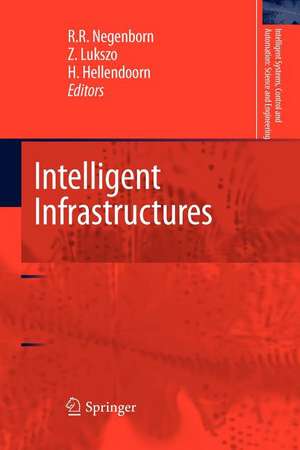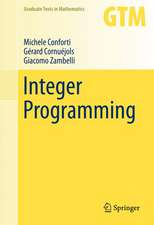Intelligent Infrastructures: Intelligent Systems, Control and Automation: Science and Engineering, cartea 42
Editat de Rudy R. Negenborn, Zofia Lukszo, Hans Hellendoornen Limba Engleză Paperback – mar 2012
| Toate formatele și edițiile | Preț | Express |
|---|---|---|
| Paperback (1) | 902.69 lei 6-8 săpt. | |
| SPRINGER NETHERLANDS – mar 2012 | 902.69 lei 6-8 săpt. | |
| Hardback (1) | 909.02 lei 6-8 săpt. | |
| SPRINGER NETHERLANDS – 16 dec 2009 | 909.02 lei 6-8 săpt. |
Din seria Intelligent Systems, Control and Automation: Science and Engineering
- 18%
 Preț: 890.23 lei
Preț: 890.23 lei - 24%
 Preț: 672.00 lei
Preț: 672.00 lei - 18%
 Preț: 951.59 lei
Preț: 951.59 lei - 15%
 Preț: 647.27 lei
Preț: 647.27 lei - 15%
 Preț: 644.63 lei
Preț: 644.63 lei - 18%
 Preț: 1246.15 lei
Preț: 1246.15 lei - 18%
 Preț: 1011.45 lei
Preț: 1011.45 lei - 20%
 Preț: 752.66 lei
Preț: 752.66 lei - 18%
 Preț: 1230.66 lei
Preț: 1230.66 lei - 18%
 Preț: 1839.32 lei
Preț: 1839.32 lei - 18%
 Preț: 719.59 lei
Preț: 719.59 lei - 15%
 Preț: 636.12 lei
Preț: 636.12 lei - 18%
 Preț: 1112.15 lei
Preț: 1112.15 lei - 18%
 Preț: 1836.31 lei
Preț: 1836.31 lei - 18%
 Preț: 1236.51 lei
Preț: 1236.51 lei - 20%
 Preț: 988.81 lei
Preț: 988.81 lei - 20%
 Preț: 357.15 lei
Preț: 357.15 lei - 15%
 Preț: 640.71 lei
Preț: 640.71 lei - 18%
 Preț: 1835.83 lei
Preț: 1835.83 lei - 18%
 Preț: 947.98 lei
Preț: 947.98 lei - 18%
 Preț: 962.98 lei
Preț: 962.98 lei - 15%
 Preț: 643.48 lei
Preț: 643.48 lei - 18%
 Preț: 951.47 lei
Preț: 951.47 lei - 18%
 Preț: 950.84 lei
Preț: 950.84 lei - 20%
 Preț: 1924.47 lei
Preț: 1924.47 lei - 15%
 Preț: 644.30 lei
Preț: 644.30 lei - 20%
 Preț: 556.64 lei
Preț: 556.64 lei - 18%
 Preț: 952.72 lei
Preț: 952.72 lei - 18%
 Preț: 953.97 lei
Preț: 953.97 lei - 18%
 Preț: 951.14 lei
Preț: 951.14 lei
Preț: 902.69 lei
Preț vechi: 1100.83 lei
-18% Nou
Puncte Express: 1354
Preț estimativ în valută:
172.73€ • 180.34$ • 142.96£
172.73€ • 180.34$ • 142.96£
Carte tipărită la comandă
Livrare economică 04-18 aprilie
Preluare comenzi: 021 569.72.76
Specificații
ISBN-13: 9789400731158
ISBN-10: 9400731159
Pagini: 564
Ilustrații: XXI, 529 p.
Dimensiuni: 155 x 235 x 30 mm
Greutate: 0.78 kg
Ediția:2010
Editura: SPRINGER NETHERLANDS
Colecția Springer
Seria Intelligent Systems, Control and Automation: Science and Engineering
Locul publicării:Dordrecht, Netherlands
ISBN-10: 9400731159
Pagini: 564
Ilustrații: XXI, 529 p.
Dimensiuni: 155 x 235 x 30 mm
Greutate: 0.78 kg
Ediția:2010
Editura: SPRINGER NETHERLANDS
Colecția Springer
Seria Intelligent Systems, Control and Automation: Science and Engineering
Locul publicării:Dordrecht, Netherlands
Public țintă
ResearchCuprins
Generic Infrastructures.- Intelligence in Transportation Infrastructures via Model-Based Predictive Control.- Model Factory for Socio-Technical Infrastructure Systems.- Electricity Infrastructures.- Prevention of Emergency Voltage Collapses in Electric Power Networks using Hybrid Predictive Control.- Module-Based Modeling and Stabilization of Electricity Infrastructure.- Price-based Control of Electrical Power Systems.- Survivability and Reciprocal Altruism: Two Strategies for Intelligent Infrastructure with Applications to Power Grids.- Multi-agent Coordination for Market Environments.- Intelligence in Electricity Networks for Embedding Renewables and Distributed Generation.- Social and Cyber Factors Interacting over the Infrastructures: A MAS Framework for Security Analysis.- Distributed Predictive Control for Energy Hub Coordination in Coupled Electricity and Gas Networks.- Road Traffic Infrastructures.- Model-based Control of Intelligent Traffic Networks.- Intelligent Road Network Control.- An Integrated Dynamic Road Network Design Approach with Stochastic Networks.- Dealing with Uncertainty in Operational Transport Planning.- Railway Dynamic Traffic Management in Complex and Densely Used Networks.- Water Infrastructures.- Flood Regulation by Means of Model Predictive Control.- Predictive Control for National Water Flow Optimization in The Netherlands.- Decentralized Model Predictive Control for a Cascade of River Power Plants.- Enhancing the Reliability and Security of Urban Water Infrastructures through Intelligent Monitoring, Assessment, and Optimization.- Long-term Sustainable Use of Water in Infrastructure Design.
Textul de pe ultima copertă
Modern societies heavily depend on infrastructure systems such as road-traffic networks, water networks, and electricity networks. Nowadays infrastructure systems are large-scale, complex networked, socio-technical systems, that almost everybody uses on a daily basis, and that have enabled us to live closely together in large cities. Infrastructure systems are so vital that their incapacity or destruction would have a fatal effect on the functioning of our society. The complexity of these systems is defined by their multi-agent and multi-actor character, their multi-level structure, their multi-objective optimization challenges, and by the adaptivity of their agents and actors to changes in their environment. The operation and control of existing infrastructures is fallible: too often people are confronted with capacity problems, dangerous situations, unreliability, and inefficiency.
More intelligent infrastructures gain an advantage in terms of more efficient capacity management, improved reliability of service, increased sustainability, and enhanced infrastructure security. Infrastructure operation should be able to more autonomously determine how to operate the infrastructure, taking into account the most up-to-date state of the infrastructure, and taking into account the existence of several decision makers, such that ultimately the infrastructure is operated in a pro-active way and issues are resolved quickly.
This book concentrates on a wide range of problems in the way infrastructures are functioning today and discusses novel advanced, and intelligent methods and tools for the operation and control of existing and future infrastructures.
More intelligent infrastructures gain an advantage in terms of more efficient capacity management, improved reliability of service, increased sustainability, and enhanced infrastructure security. Infrastructure operation should be able to more autonomously determine how to operate the infrastructure, taking into account the most up-to-date state of the infrastructure, and taking into account the existence of several decision makers, such that ultimately the infrastructure is operated in a pro-active way and issues are resolved quickly.
This book concentrates on a wide range of problems in the way infrastructures are functioning today and discusses novel advanced, and intelligent methods and tools for the operation and control of existing and future infrastructures.
Caracteristici
The book shows in a coherent way several kinds of intelligence for infrastructures It is demonstrated how infrastructures can be made more intelligent Novel, state-of-the-art methods and tools for the operation and control of infrastructures are proposed Different points-of-view on how to use intelligence for modeling and control of infrastructure systems are brought together Analogies between different infrastructures are drawn











